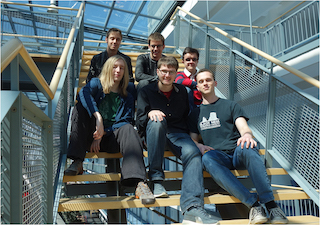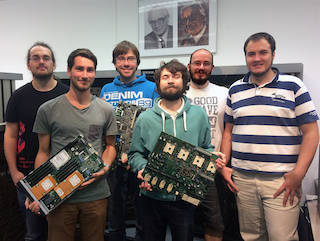
Team PhiClub of Technical University of Munich (TUM) Back, from left: Stefan Haas, David Schneller, and Svilen Stefanov. Front, from left: Sharru Møller, Maximilian Hornung, and Jan Schuchardt
Today the Gauss Centre for Supercomputing (GCS) in Germany announced it is co-sponsoring undergraduate students participating in the SC16 Student Cluster Competition (SCC). This year, GCS provides financial support for two German teams which were accepted for the multi-disciplinary HPC challenge integrated within the Supercomputing Conference 2016 (SC16) in Salt Lake City (Utah, USA): team PhiClub of the Technical University of Munich (TUM) and team segFAUlt representing the Friedrich-Alexander University Erlangen-Nürnberg (FAU). The two teams of Bavarian universities are the only European attendees in this year’s SCC, which consists of 14 teams from around the world.
It is no secret that very often financial constraints prohibit students to realize their participation in these kind of contests, especially when international travel is involved. As it is GCS’s mission to promote young and bright talents in the field of HPC, we are happy to provide additional financial resources that enable students to enter challenges such as the SC’s Student Cluster Competition,” affirms Dr. Claus Axel Müller, Managing Director of GCS. “We are positive that, independent of the outcome, it will be a great experience for the students, and we wish both teams best of luck and lots of success!”
According to the SCC rules, the teams of six students each will have to compete in a non- stop, 48-hour challenge held on the SC16 showground. Working on their self assembled compute cluster, which should be designed to accommodate a variety of HPC workflows while keeping a strict 3120-watt power limit, the students will have to complete a real-world scientific workload which, in the course of the run, will come with some unexpected elements of surprise. Equally important for the overall valuation of the teams will be whether the students manage to impress conference attendees and especially interview judges with their HPC knowledge.

Team segFAUlt of Friedrich – Alexander University Erlangen- Nürnberg (FAU), From left: Markus Fritscher, Jan Laukemann, Benedikt Oehlrich, George Heath, Marcel Gedat and Kai Streitferdt
The two German teams of undergraduate students are competing at this year’s SC16 against teams from the USA (6), China (3), Singapore, Taiwan and Colombia.
The GCS had proudly sponsored a team of bachelor students of the Technical University of Munich at last year’s SCC. Team TUMuch Phun had captured an excellent third place in the overall ranking and has ensured the entry of their name in the all-time list of SCC awardees by winning the hotly contested High Performance Linpack benchmark run.
In related news, there is still time to enter your team into the ISC-HPCAC Student Cluster Competition, which takes place June 19-21, 2017 in Frankfurt, Germany.
See our complete coverage of SC16, which takes place Nov. 13-18 in Salt Lake City.



